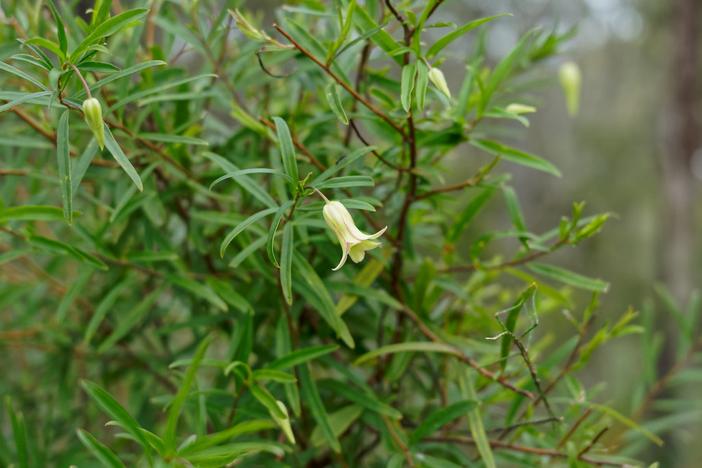Common Appleberry
(Billardiera scandens)
Common Appleberry (Billardiera scandens)
/
/

Tatters ✾
CC BY 2.0
Image By:
Tatters ✾
Recorded By:
Copyright:
CC BY 2.0
Copyright Notice:
Photo by: Tatters ✾ | License Type: CC BY 2.0 | License URL: https://creativecommons.org/licenses/by/2.0/ | Uploader: Tatters ✾ | Publisher: Flickr







































































Estimated Native Range
Summary
Billardiera scandens, commonly known as Common Appleberry, is an evergreen perennial vine native to the understory of eucalyptus forests, coastal heathlands, and scrublands in Southeastern Australia. It typically grows to a height of 1-5 feet and a width of 4-9 feet, with a twining and scrambling habit that allows it to climb over other vegetation or form a dense ground cover. The plant features slender stems with oval-shaped, glossy green leaves and produces clusters of bell-shaped flowers that are pink and white in the spring, which are quite showy and attract pollinators. Following the flowering season, it bears oblong berries up to 30 mm long, initially green and covered in fine hair, resembling a miniature kiwifruit. These berries mature to a yellow or sometimes purple color and are edible, with a sweet taste that is appealing to both birds and humans.
Common Appleberry is valued for its ornamental flowers, edible fruit, and low maintenance requirements. It is often used in Australian gardens to create a naturalistic setting, particularly under eucalyptus trees or among other native species. The plant is also cultivated internationally in gardens that emulate an Australian bushland theme. It is an adaptable species, tolerating a range of conditions including mild frost, semi-shade, and periods of dryness, although it thrives in moist, well-drained soils. Full sun to part shade is ideal for optimal growth. While generally disease-free, it can occasionally suffer from scale insects or fungal diseases in poor conditions. It is easily propagated from seed or cuttings and is not known to be invasive when grown outside its native range.CC BY-SA 4.0
Common Appleberry is valued for its ornamental flowers, edible fruit, and low maintenance requirements. It is often used in Australian gardens to create a naturalistic setting, particularly under eucalyptus trees or among other native species. The plant is also cultivated internationally in gardens that emulate an Australian bushland theme. It is an adaptable species, tolerating a range of conditions including mild frost, semi-shade, and periods of dryness, although it thrives in moist, well-drained soils. Full sun to part shade is ideal for optimal growth. While generally disease-free, it can occasionally suffer from scale insects or fungal diseases in poor conditions. It is easily propagated from seed or cuttings and is not known to be invasive when grown outside its native range.CC BY-SA 4.0
Plant Description
- Plant Type: Vine
- Height: 1-4.5 feet
- Width: 4-9 feet
- Growth Rate: Moderate
- Flower Color: Pink, White
- Flowering Season: Spring
- Leaf Retention: Evergreen
Growth Requirements
- Sun: Full Sun, Part Shade
- Water: Medium
- Drainage: Slow, Medium
Common Uses
Bee Garden, Butterfly Garden, Edible*Disclaimer: Easyscape's listed plant edibility is for informational use. Always verify the safety and proper identification of any plant before consumption., Groundcover, Low Maintenance, Street Planting
Natural Habitat
Understory of eucalyptus forests, coastal heathlands, and scrublands in Southeastern Australia
Other Names
Common Names: Apple-Berry, Apple-Dumpling
Scientific Names: , Billardiera scandens, Billardiera mutabilis, Sollya angustifolia, Billardiera canariensis, Billardiera latifolia, Billardiera scandens var. brachyantha, Billardiera brachyantha, Billardiera brachyantha var. phyllocalyx, Billardiera daphnoides
GBIF Accepted Name: Billardiera scandens Sm.